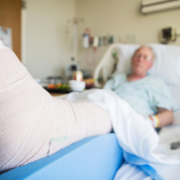The Importance of Medical Records in Personal Injury Claims
Personal injury law is a crucial component of the justice system in Alabama that caters to individuals who have suffered harm due to the negligence or wrongful actions of others. These cases can range from automobile accidents and workplace injuries to slips and falls or medical malpractice. Central to the successful navigation of personal injury claims is the role of medical records.
In Alabama personal injury cases, the details contained within medical documentation are not just mere formalities; they are the cornerstone upon which cases are built and adjudicated. Medical records serve as an irrefutable chronicle of the injuries sustained, the treatments undertaken, and the impact of the incident on the victim’s life.
Understanding Personal Injury Claims in Dothan, AL
Personal injury is defined as physical or psychological harm caused to an individual due to another party’s negligence or intentional acts. This broad legal term encompasses a variety of incidents, each with its own nuances and complexities.
Common types of personal injury cases in Dothan, AL include:
- Automobile Accidents: These are the most frequent causes of personal injury claims, involving collisions between cars, motorcycles, trucks, and other vehicles. Factors like reckless driving, driving under the influence, and distracted driving often contribute to these accidents.
- Workplace Injuries: Dothan’s diverse economic landscape, ranging from agriculture to manufacturing, leads to a variety of workplace injuries. These can result from equipment malfunctions, unsafe working conditions, or lack of proper safety measures.
- Slip and Fall Accidents: Occurring in both public and private properties, these incidents are often a result of hazardous conditions like wet floors, uneven surfaces, and poorly lit areas.
- Medical Malpractice: Instances where healthcare professionals deviate from standard practices, leading to patient injury or wrongful death, constitute medical malpractice cases.
- Product Liability: This involves injuries caused by defective or dangerous products, which can range from household items to industrial equipment.
The Legal Landscape of Personal Injury Law in Alabama
Key elements of Alabama’s personal injury laws include:
- Contributory Negligence: Alabama follows the strict doctrine of contributory negligence, meaning if a plaintiff is found even partially at fault for their injury, they may be barred from recovering damages.
- Statute of Limitations: In Alabama, personal injury claims must generally be filed within two years from the date of the injury. This time limit is crucial as failing to file within this period typically results in the loss of the right to seek compensation.
- Damage Caps: Alabama law imposes caps on certain types of damages. For example, punitive damages in medical malpractice cases are capped, which affects the compensation amount a plaintiff can receive.
- Insurance Requirements: In cases like automobile accidents, Alabama’s insurance laws, mandating liability coverage, play a significant role in the compensation process.
The Role of Medical Records in Personal Injury Cases
Medical records play a pivotal role in Alabama personal injury claims. These records are comprehensive documents that detail an individual’s medical history and the treatments they have received. Some of the most important types of medical documentation include:
- Initial Medical Reports: These are created following the first medical examination after an incident, providing a baseline for the individual’s health immediately post-injury.
- Diagnostic Records: This includes results from X-rays, MRI scans, blood tests, and other diagnostic tools that provide concrete evidence of the nature and extent of the injuries.
- Treatment Records: Detailed accounts of treatments, surgeries, medications, physical therapy, and other forms of ongoing care document the process of recovery and rehabilitation.
- Physician’s Notes: Observations and opinions from medical professionals regarding the injury, its probable cause, and its long-term implications offer valuable insights into the case.
- Billing Information: Itemized billing statements provide a record of the financial impact of the medical treatment necessitated by the injury.
Importance of Medical Documentation in Proving Injury and Causation
Medical records serve as the bedrock of evidence in personal injury cases, as they provide objective data regarding the injuries sustained. These records are critical for several reasons:
- Substantiating the Injury: They offer strong proof that the injury occurred and required medical attention, thus establishing the necessity of the claim.
- Proving Causation: Medical records can help draw a direct line between the incident (such as an automobile accident or a slip and fall) and the injuries documented, thereby establishing causation, which is essential in personal injury litigation.
- Documenting the Severity and Impact: The detailed nature of these records allows for an assessment of the severity of the injury and its impact on the individual’s life, which is crucial in determining the appropriate level of compensation.
Impact of Medical Records on the Credibility of the Injury Claim
The integrity and credibility of a personal injury claim are significantly bolstered by comprehensive and meticulously maintained medical records. These records impact the claim in several ways:
- Enhancing Credibility: Consistent and detailed medical documentation lends credibility to the claimant’s account of their injuries and their aftermath. Incomplete or inconsistent records, conversely, can raise doubts about the claim’s validity.
- Aiding Legal Arguments: Lawyers often rely heavily on medical records to construct persuasive legal arguments. The precise details contained within these records provide a strong foundation for establishing the link between the incident and the injuries claimed.
- Quantifying Economic Damages: Medical records provide a detailed account of all the medical expenses incurred due to the injury. This includes costs for emergency care, hospital stays, surgeries, medications, physical therapy, and any long-term healthcare needs.
- Evaluating Non-Economic Damages: The subjective aspects of a personal injury claim, such as pain and suffering, emotional distress, and loss of enjoyment of life, are also influenced by medical documentation. Records that illustrate the severity of the injury, the pain endured during treatment, and the long-term physical and mental impacts can be pivotal in assigning a monetary value to these non-economic damages.
- Supporting Future Medical Expenses: In cases of severe injuries that entail ongoing medical care, medical records can help in projecting future medical expenses. Detailed documentation of the injury’s prognosis, the anticipated course of treatment, and expert opinions on future medical needs are essential in ensuring that future costs are adequately covered in the compensation.
- Influencing Jury Perceptions: If a case goes to trial, medical records become critical exhibits. They not only help in clearly demonstrating the injury’s impact to a jury but also lend credibility to the victim’s narrative. Detailed and well-maintained medical records can be compelling in swaying jury opinions, often leading to higher compensation awards.
Contact Our Reputable Dothan, AL Personal Injury Firm
If you or a loved one suffered a personal injury in Alabama that was caused by someone else’s negligence or reckless actions, you do not have to go through this ordeal alone. At M. Adam Jones & Associates, we understand the importance of building a strong claim using thorough medical records and other critical pieces of evidence, and we put our extensive experience to work to put you in the best possible position to recover maximum compensation. Contact us today for a free consultation and case assessment.
- Adam Jones,
Managing Partner
- Adam Jones & Associates, LLC
206 N. Lena St.
Dothan, AL 36303
Tel: 334-699-5599
Fax: 334-699-5588





Leave a Reply
Want to join the discussion?Feel free to contribute!